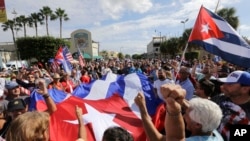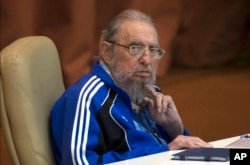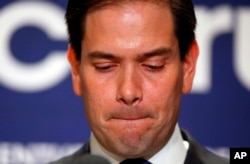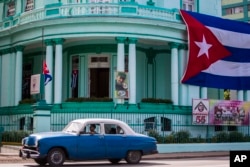President Barack Obama reached out to the Cuban people following the news of the death of Fidel Castro to offer his condolences and let them know he would continue his effort to normalize relations with the country.
“Today, we offer condolences to Fidel Castro's family, and our thoughts and prayers are with the Cuban people,” Obama said in a statement. “In the days ahead, they will recall the past and also look to the future. As they do, the Cuban people must know that they have a friend and partner in the United States of America.”
Understanding that Cubans — both in the U.S. and in Cuba — hold mixed feelings about the legacy of Castro, Obama didn’t praise or denounce Castro as some other world leaders did, but instead said he would allow history to record and judge Castro’s impact on the world.
“During my presidency, we have worked hard to put the past behind us, pursuing a future in which the relationship between our two countries is defined not by our differences but by the many things that we share as neighbors and friends — bonds of family, culture, commerce and common humanity,” he said.
President-elect Donald Trump initially tweeted early Saturday morning: “Fidel Castro is dead!”
He later released a statement in which he called Castro a “brutal dictator” who oppressed his own people for nearly 60 years.
“Fidel Castro’s legacy is one of firing squads, theft, unimaginable suffering, poverty and the denial of fundamental human rights,” Trump said.
While Trump took a hard stance against Castro himself, he said he hoped Castro’s death would mark “a move away from the horrors endured for too long by the Cubans” and said his administration would work to ensure the Cuban people will find prosperity and liberty.
News of Castro's death late Friday at age 90 sparked celebrations among the country's exiles in Miami, and expressions of sorrow from others, including some world leaders.
"The day that the people, both inside the island and out, have waited for has arrived: A tyrant is dead and a new beginning can dawn on the last remaining communist bastion of the Western Hemisphere," U.S. Congresswoman Ileana Ros-Lehtinen, who represents Florida's 27th district, said in a statement.
Florida Senator Marco Rubio, who ran against Trump to be the Republican presidential candidate, said Castro turned Cuba into "an impoverished island prison" where dissidents were routinely jailed and killed.
"The dictator has died, but the dictatorship has not," Rubio said in a statement. "The future of Cuba ultimately remains in the hands of the Cuban people, and now more than ever Congress and the new administration must stand with them against their brutal rulers and support their struggle for freedom and basic human rights."
'Cuba libre!'
Some of the exiles in Miami were draped in Cuban flags. Others danced in the streets, some dazed in disbelief that this day — so long wished for — was finally here.
"Cuba si! Castro no!'' people chanted in the streets, while others screamed "Cuba libre!''
Financial executive Gabriel Morales, 40, whose parents left Cuba decades ago, said the news of Castro's death "seems unreal.''
Carlos Lopez, also in Miami, told The Miami Herald, "We are not celebrating one man's death, but the death of an ideology. We are celebrating that little piece of liberty we got back today."
Reaction on the island, slow to emerge because many citizens were asleep at the time of the government's announcement, was mixed.
"In Cuba, some are mourning, some are relieved, the majority with a certain amount of indifference, Castro's legacy is one of a nation in ruins, a nation where youth want to escape," Yoani Sanchez said on Twitter.
"I am very upset. Whatever you want to say, he is public figure that the whole world respected and loved," said Havana student Sariel Valdespino.
Reaction among world leaders was mixed.
U.N. Secretary-General Ban Ki-moon offered the support of the U.N. to the people of Cuba during spoken remarks at a sustainable transportation conference in Turkmenistan.
"Under the former President Castro, Cuba made advances in the fields of education, literacy and health. I hope that Cuba will continue to advance on a path of reform and greater prosperity,” Ban said.
Nicolas Maduro, president of Venezuela, said he spoke to Raul Castro, Fidel's brother, to convey solidarity with the Cubans.
Spanish President Mariano Rajoy Brey gave his condolences to Cuba and called Castro "a figure of historical significance."
Similarly, Indian Prime Minister Narendra Modi called Castro "one of the most iconic personalities of the 20th century."








